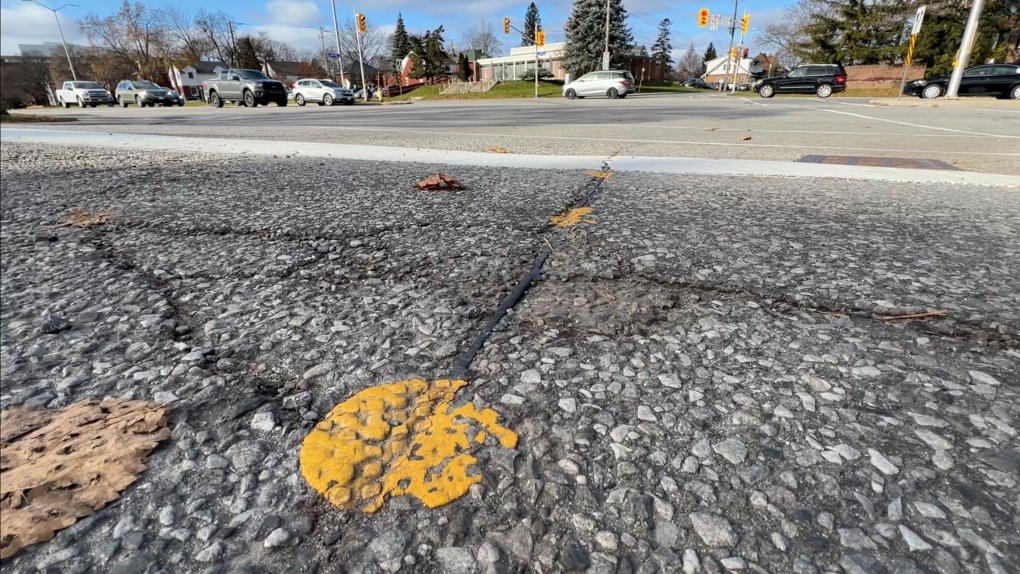
Councillor renews push to eliminate red reverts at Ottawa intersections
 A sensor at a traffic light on Carling Avenue and Maple Drive in Ottawa. (Tyler Fleming/CTV News Ottawa)
A sensor at a traffic light on Carling Avenue and Maple Drive in Ottawa. (Tyler Fleming/CTV News Ottawa)
An Ottawa councillor is renewing his push to eliminate red light technology at intersections so cyclists have a green light when they activate the sensors.
Coun. Jeff Leiper will introduce a motion at Wednesday's council meeting to eliminate revert red traffic signals, also known as red reverts, at intersections. The motion comes six weeks after the transportation committee defeated Leiper's motion to eliminate the technology that cycling advocates say is dangerous.
Under council's procedure bylaws, when an item fails at a standing committee, it will not be forwarded to council for a discussion and vote. A councillor can bring forward a motion to council to consider an item.
A red revert occurs when a vehicle or bicycle trips a sensor at an intersection, leading to a traffic light change. Before the light changes, the sensor does a final check to ensure there's still a car or bike on the sensor. If there is, the light turns green.
What Leiper wants is to eliminate red revert traffic signals so that when the sensor detects a cyclist at the intersection, they will receive a green light even if the bike moves off the sensor area. The adjustment would be made at signalized intersections that have a bike lane.
Ottawa has approximately 1,000 intersections with sensors, with most commonly used where lower-volume streets intersect with high-volume streets.
City staff, including police and fire services and transit services oppose eliminating red reverts at intersections.
CTVNews.ca Top Stories

Outdated cancer screening guidelines jeopardizing early detection, doctors say
A group of doctors say Canadian cancer screening guidelines set by a national task force are out-of-date and putting people at risk because their cancers aren't detected early enough.
Lululemon unveils first summer kit for Canada's Olympic and Paralympic teams
Lululemon says it is combining function and fashion in its first-ever summer kit for Canada's Olympians and Paralympians.
'I just started crying': Blue Jays player signs jersey for man in hospital
An Ontario woman says she never expected to be gifted a Blue Jays jersey for her ailing husband when she sat alone at the team’s home opener next to a couple of kind strangers.
Mussolini's wartime bunker opens to the public in Rome
After its last closure in 2021, it has now reopened for guided tours of the air raid shelter and the bunker. The complex now includes a multimedia exhibition about Rome during World War II, air raid systems for civilians, and the series of 51 Allied bombings that pummeled the city between July 1943 and May 1944.
LIVE @ 4 EDT Freeland to present 2024 federal budget, promising billions in new spending
Canadians will learn Tuesday the entirety of the federal Liberal government's new spending plans, and how they intend to pay for them, when Deputy Prime Minister and Finance Minister Chrystia Freeland tables the 2024 federal budget.
B.C. woman facing steep medical bills, uncertain future after Thailand crash
The family of a Victoria, B.C., woman who was seriously injured in an accident in Thailand is pleading for help as medical bills pile up.
Step inside 'The Brain': Northern education tool aims to promote drug safety
An immersive experience inside a massive dome coined 'The Brain' is helping youth learn about brain function and addiction
WATCH Half of Canadians living paycheque-to-paycheque: Equifax
As Canadians deal with a crushing housing shortage, high rental prices and inflationary price pressures, now Equifax Canada is warning that Canadian consumers are increasingly under stress"from the surging cost of living.
Ontario woman charged almost $7,000 for 20-minute taxi ride abroad
An Ontario woman was shocked to find she’d been charged nearly $7,000 after unknowingly using an unauthorized taxi company while on vacation in January.
































